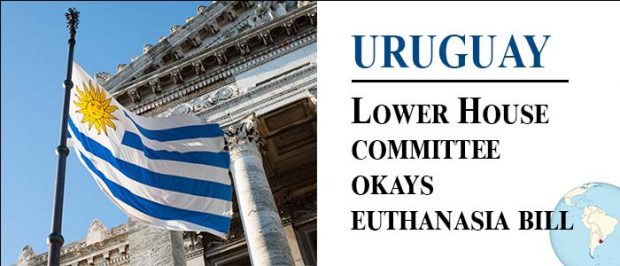September 11, 2022
Uruguay Parliament Supports Euthanasia Bill
The Health Committee of Uruguay’s Lower House has passed a bill approving euthanasia leading to the headline, ‘Uruguay Parliament Supports Euthanasia Bill’ reports Mercopress.
The body is now to debate the issue in a plenary session, probably next month, it was reported in Montevideo.
The bill consists of 12 articles and combines the original text submitted by Congressman Ope Pasquet from the Colorado Party and the opposition Frente Amplio (FA – Broad Front) proposal.
FA Congresswoman Cristina Lustemberg, who voted in favor of the bill, pointed out that “the conditions that the health team has to take into account are very clear” when deciding if a person is eligible for medically ending his/her own life.
“Any person of legal age, psychically fit, who suffers from one or more chronic, incurable and irreversible pathologies or health conditions that seriously undermine their quality of life, causing them unbearable suffering, has the right to be euthanized at their request and through the procedure established in the present law, so that their death takes place in a painless, peaceful and respectful way to their dignity”, states article 2 of the bill voted on Tuesday.
The bill seeks to “regulate and guarantee the right of individuals to spend the process of dying with dignity and to receive assistance to do so in the circumstances indicated in the text,” it was explained.
“The right of individuals to decide on their own destiny and to avoid suffering that they consider unbearable according to their personal perception is recognized.
Likewise, through this law, concrete guarantees are established for patients, physicians and other actors involved in the assistance process,” the Committee argued.
A patient who wishes to receive assistance in dying must go through a series of stages and medical interviews before his/her request is approved.
According to Article 4 of the bill, the first step is the initiative of the patient, who must request it personally from a physician, who will then need to state his/her professional opinion.
“Then the acting physician will dialogue with the patient; he will give him information about the available treatments, including palliative care, and will verify that the will he expresses is free, serious and firm.
If the aforementioned conditions are not verified or the will of the applicant does not have the indicated characteristics, the acting physician will terminate the procedure…”
The patient may then seek help from “another physician,” the bill adds.
But if all requirements are met, the acting physician will ask a colleague to consider the patient’s request.
This second professional must hold a face-to-face consultation with the patient and study his or her medical history within a period of no more than ten days.
“The second physician must not be subordinate to the first in any way.
There must be no kinship link between the two physicians, nor between either of them and the patient, up to at least the fourth degree of consanguinity,” the bill states.
The procedure will continue if the second physician confirms the opinion of the first one.
Otherwise, the lead physician would have to seek the opinion of a third professional and if the latter also speaks against the procedure, it will be terminated and the patient will be notified.

“No less than three days after the last interview with the acting physician, the person who persists in his will to end his life shall declare and record it in writing before two witnesses, at least one of whom shall not receive any financial benefit from the death of the declarant.
Uruguay Parliament Supports Euthanasia Bill
The time limit for the declaration of the last will may be less than three days if the acting physician considers, for reasons to be recorded in the clinical history, that there is a risk of the patient losing the capacity to express it validly,” the text states.
Once the patient has expressed his or her last will, the acting physician will proceed to carry it out and after his or her death the professional must immediately communicate it to the Ministry of Public Health (MSP).
If the MSP considers that there was a serious deviation from the legal procedure, the Attorney General’s Office will be informed.
Exitorial Note
While this proposed law is heavily medicalised, it is progressive in the sense that it includes health conditions that ‘seriously undermine their quality of life’.
This could – for all intents and purposes – include advanced old age.
The second point of interest is that the Bill discusses end of life choices as a ‘right’. This is a welcome inclusion.
This development in Uruguay follows other developments on end of life issues in Peru and Colombia.